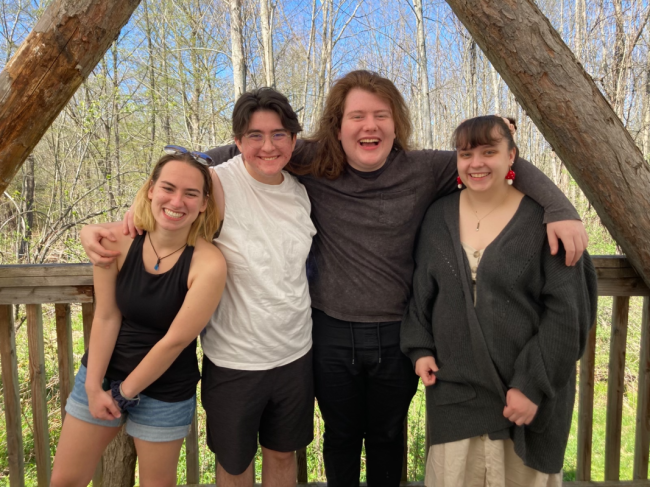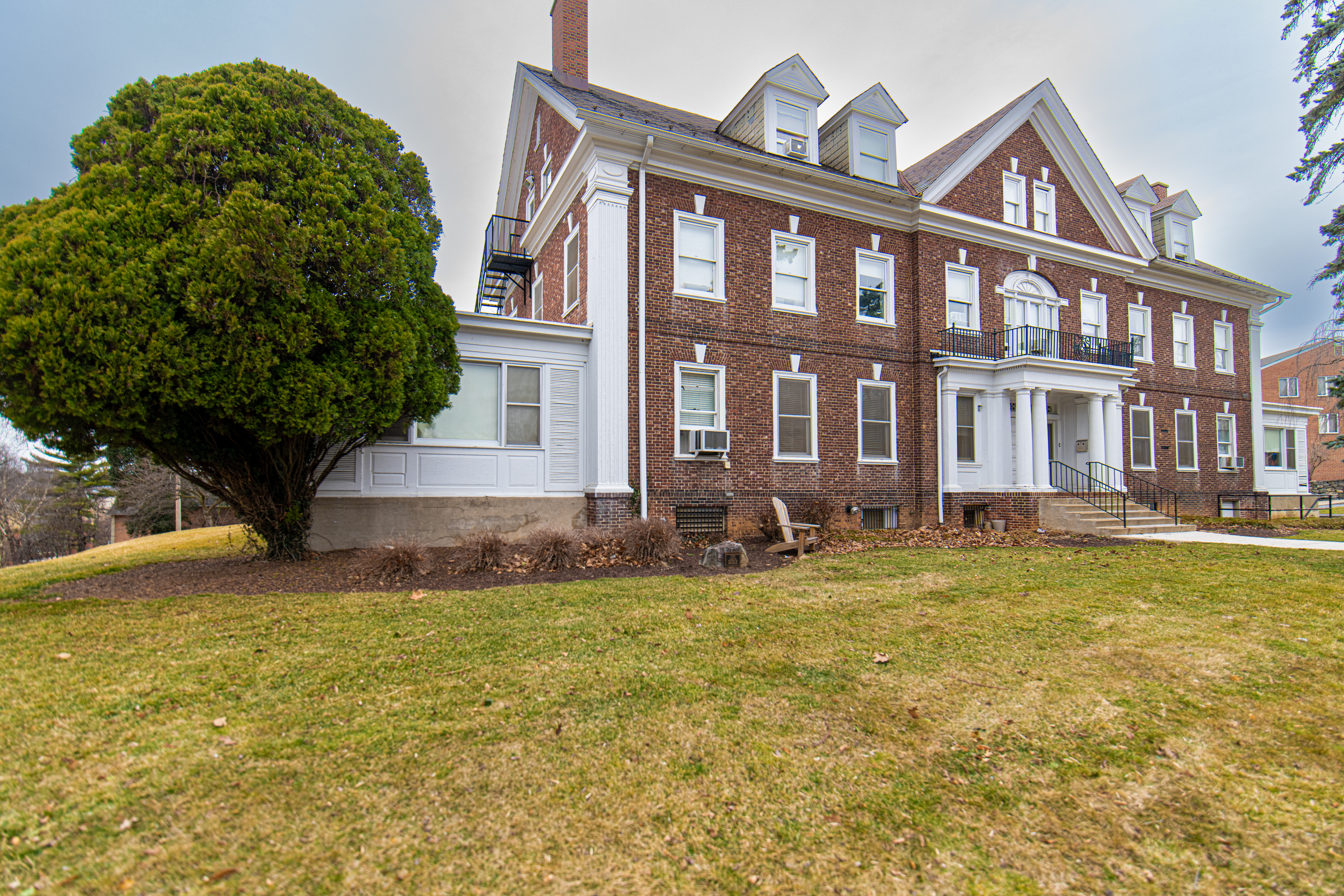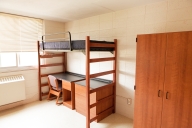You have /5 articles left.
Sign up for a free account or log in.

Four residents of Open Pages pose at Firelight Camps, a camping site near Ithaca's campus, during an off-campus excursion.
Jay Barrett
Ithaca College in New York has long been considered a safe and welcoming place for LGBTQ+ students, and its residence halls are no exception. For years, the institution has offered gender-neutral housing, allowing students to live with roommates of any gender; transgender students are invited to contact Residential Life if they need help meeting any additional needs.
For a while, that was enough. But now a group of transgender students wants their housing to be more than simply a place where they feel safe from discrimination.
“We noticed that even though this accommodation was in place, it still couldn’t really make up for the fact that the majority of dorms, like most colleges, weren’t built with trans people in mind,” said Jay Barrett, a junior writing major who is transgender.
Barrett and two other students wanted to open a residential learning community specifically for trans and nonbinary students, so they approached the Residential Life staff with their vision: a floor in Ithaca’s West Tower residence hall, which has gender-neutral bathrooms and is located near the college’s Center for LGBT Education, Outreach & Services. While the staff was enthusiastic about the idea, they were initially reluctant to accommodate some of the students’ requests, such as converting some of the floor’s two-person rooms to singles.
.jpeg)
Eventually, though, they acquiesced after receiving some “respectful pushback,” according to Marsha Dawson, Ithaca’s dean of students and the former director of residential life.
“The priority wasn’t money, it wasn’t filling beds; it was making sure the students were comfortable,” she said.
Last fall, the three students helped open the 20-bed Open Pages Residential Learning Community with all their initial requests fulfilled, from the location to the desired number of single rooms.
“It isn’t necessarily the most profitable, but it’s something that shows they care first and foremost for the students’ needs,” Barrett said.
Open Pages has quickly become a beloved resource and gathering spot for trans and nonbinary students on campus, hosting a slew of well-attended events, including a Jeopardy!-style trivia night and trick-or-treating on Halloween.
The residents became a community during their first semester together, according to Gwyneth Cole, a nonbinary student and resident assistant for the RLC.
“Everyone chats with each other in the halls. I know that when I walk into my floor, I know that it will take me 10, 15 minutes to get to my door … because I’ll run into people,” they said.
Creating Community
Colleges have been working for years to make transgender and nonbinary students feel comfortable living on campus. Many institutions have established a process for such students to make specific roommate requests; others offer gender-neutral halls, where students of any gender may live together. And some institutions are entirely gender-neutral, allowing students living anywhere on campus to request a roommate of any gender.
But few campuses have halls or communities dedicated to creating a welcoming, inclusive community for LGBTQ+ students, and even fewer offer such spaces specifically for transgender and nonbinary students.
Kristen A. Renn, a professor of higher, adult and lifelong education at Michigan State University who has been studying LGBTQ+ student services since 1991, recalled that the first trans-specific living and learning communities (LLCs) sprang up about 15 years ago. But such spaces remain rare, generally found only at private, progressive liberal arts colleges.
Some trans and nonbinary students prefer staying together to living alone even on a gender-neutral hall or in an off-campus apartment because of the social element, said Renn. The opportunity to bond with fellow transgender students is a major draw, she said, as is the intellectual component on campuses where the LLC offers an accompanying course.
At the same time, creating such communities can help the university show it cares about LGBTQ+ students.
“For some campuses, it’s a really important symbol for the institution’s support of trans and nonbinary students,” Renn said. “It can be controversial, so when a campus does it, it’s sort of a policy statement that says, ‘We are committed to supporting trans students.’”
Before Open Pages, Ithaca had another RLC targeted at trans students. But it was designed more to ensure a safe living environment than to foster community and connections. Even now, living in a gender-neutral room in a regular dorm or apartment can mean passing people in the hallways or communal bathrooms who may not be as accepting as the student’s roommates.
While providing safety and acceptance isn’t the only goal of Open Pages, Barrett said that it still feels nice to have a place where he is completely comfortable and certain his identity will be respected.
“I’ve never felt unsafe at the college, but I’ve been a little on edge in the bathrooms,” he said.
Increasing Demand
 Several other colleges also recently launched new floors or houses aimed at transgender and other LGBTQ+ students. Lafayette College, a small, private institution in Pennsylvania, took applications from LLCs to take over a decommissioned sorority house, and the winning proposal came from OUT, the college’s relatively new LGBTQ+ student organization. The house has been renamed Lavender Lane, for the plant and a color frequently associated with the LGBTQ+ community. The college also features a gender-neutral floor for first-year students.
Several other colleges also recently launched new floors or houses aimed at transgender and other LGBTQ+ students. Lafayette College, a small, private institution in Pennsylvania, took applications from LLCs to take over a decommissioned sorority house, and the winning proposal came from OUT, the college’s relatively new LGBTQ+ student organization. The house has been renamed Lavender Lane, for the plant and a color frequently associated with the LGBTQ+ community. The college also features a gender-neutral floor for first-year students.
Meredith McGee, a senior studying biology and history who serves as Lavender Lane’s president, said that while Lafayette already allowed students to live with any roommate regardless of gender, that placed the onus on the student to find people they are comfortable living with.
“Just because you’re friends with someone doesn’t mean you live well together,” she said. “Having a dedicated house to be gender-inclusive … doesn’t come with the burden of putting your own community together.”
Virginia Tech also launched an LGBTQ+ living and learning community this year, called Lavender House. All students living in an LLC at the university take a three-credit course to supplement their residential experience; students living in Lavender House take an introductory queer studies course, according to Jess Silvia, the program director for the house.
Trans and nonbinary LLCs appear to be in high demand; at all three institutions, more students applied to live in the communities than there was room for. That’s not surprising, given that young people are much more likely than older generations to identify as transgender. According to recent research, about 1.4 percent of U.S. teens between age 13 and 17 and 1.3 percent of young adults between 18 and 24 identify as trans, compared with only 0.5 percent of the nation’s total adult population.
Barrett said initially he wasn’t sure if Ithaca’s Open Pages would even fill up, and was surprised when he ended up having to turn people away. He, the other founders and the residential life staff who evaluated the applications tried to select those who seemed to have the greatest need to live on the hall.
But at Ithaca and VT, plans are already underway to expand their gender-inclusive housing; Ithaca will add a floor in the same building for first-year students, and VT is hoping to expand its space for trans and nonbinary students over the next several years.
Despite the popularity of such LLCs, colleges and universities may face a number of hurdles in seeking to open transgender or LGBTQ+ living spaces for students, Renn said. If a university typically includes educational programming with their LLCs, for example, it will need to add queer studies courses if it doesn’t already offer them. The college may also have to hire new residential life staff who are well versed in LGBTQ+ issues to oversee the space.
“It is a kind of project that often illuminates other aspects of campus that could also be improved,” she said. “I think about it like a spiderweb, where you pluck it one place and it sends vibrations out.”








